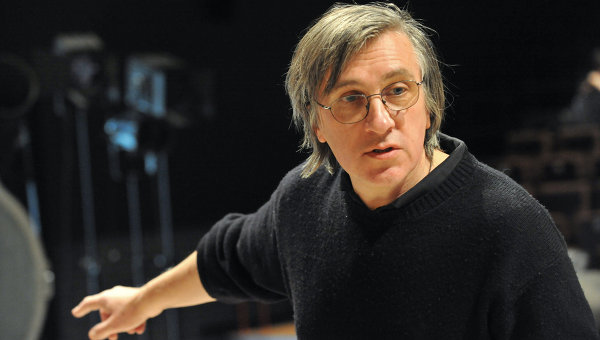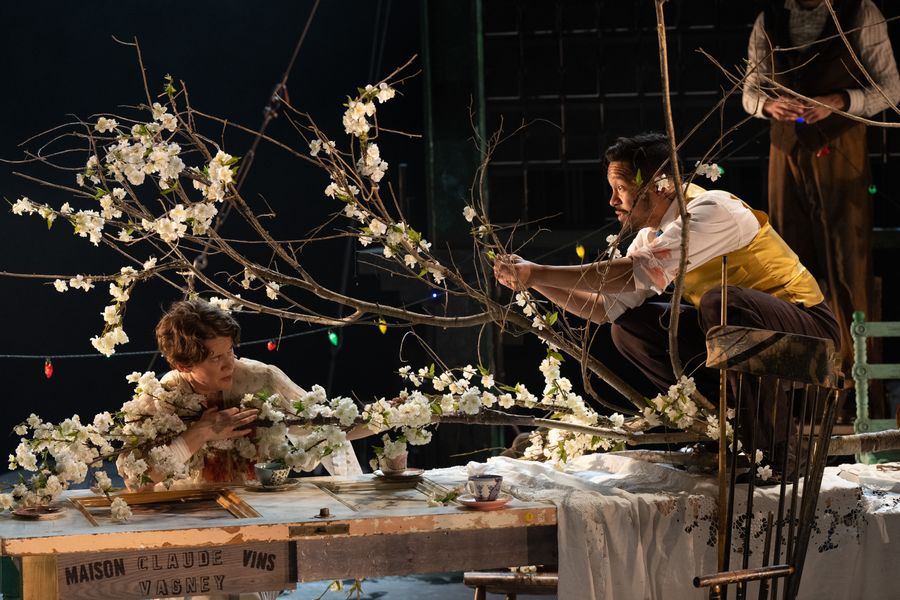“I am Ranyevska.”
In a Flaubertian moment (“Madame Bovary, c’est moi”), his eyes filling with tears, Dmitry Krymov contemplates his lost home as the news from Ukraine grows ever more dire. The renowned Russian director is in Philadelphia to direct Chekhov’s The Cherry Orchard at the Wilma Theater (running through May 1 and available to stream May 2-15).
There is perhaps no playwright more closely identified with Russia than Chekhov, and his last play, The Cherry Orchard, is about Russia itself. So there is no ignoring the elephant in the room. Through a translator, Krymov talks about the current political reality:
I am in the same position as Ranyevska, right? My cherry orchard, somebody has just taken it away. In Moscow right now, I have five shows that were supposed to be rehearsed and opened, and one movie that almost finished. I had plans for three years ahead. And here, I have nothing. I had a return ticket for three days after the opening. The planes are not flying and I’m not going there. In Moscow, the situation is horrible, horrific. It’s impossible. So I’m asking myself the same question: What are you going to do after this? It’s not Paris, it’s New York. But it doesn’t really matter, does it?
Of course the Chekhovian theme, the theme that is in The Cherry Orchard: It was here, and now it’s gone. The life.
And we’re looking back and thinking we were so silly. We were treating everything that was happening in the country like, “Oh, yeah, a little bit worse, a little bit worse, but still we can deal with it, we can survive, we can live, we can work. I can work.” And all of a sudden, you cannot live and you cannot work, and this is it. And the reactions from the characters in The Cherry Orchard are exactly the same: “We can survive, we can survive.” Basically, you can look at the play as if you’re looking in the mirror, and sometimes it’s really scary when you’re looking in the mirror.
That mirror became all the more disturbing on opening night, when some in the Wilma Theater opening night audience applauded Yasha (Matteo Scammell), the crass and vulgar creep in Mme. Ranyevska’s entourage. People often laughed at the saddest moments. Those unfamiliar with Chekhov’s play may be mystified.

The Wilma production begins with the actor who plays Varya (Sarah Gliko) playing an accordion and singing the plaintive, “I dreamed of an orchard/In its wedding dress.” Then Krymov rips off this band-aid of melancholy and gives us the first of many pratfalls: Dunyasha (Brett Ashley Robinson) drops a bowl of cherries. She mouths to us, “I tripped,” as the stage is covered with squashed cherries which will stain—find symbols where you will—everyone’s clothes.
The frequent meltdowns, tearful apologies, shouted cross-talk, breaking of stuff, tearing of stuff—all seem to suggest that this pandemonium is the reality of these lives underneath the traditional civilized tragicomic surface that usually characterizes productions of Chekhov.
Central to the minimal set, co-designed by Krymov and Irina Kruzhilina, is a huge railway flipboard. This is Krymov’s governing idea, especially important in that Chekhov’s play is built on arrivals and departures. He explains its origin and significance:
You come up with some very concrete idea, a theatrical idea, right? But it has to be this material idea that you can express through material, and you’re going to tell the story onstage through that material idea. To tell the audience that it’s all happening at the train station is to tell nothing. But if you can talk to that train board, all of a sudden you can talk, communicate with the board. Then it turns from the simple train board into an advisor or caring father or old grandfather who doesn’t understand anything sometimes, when in reality he understands everything. Or somebody who’s very jealous, or…
Sometimes the board helps, sometimes the board is totally in the way. It’s the fate, if you wish—fate that is above us. But this trainboard, it’s like the phone. It’s a very dangerous thing. We have it in our pockets now, because you don’t know what information you’re going to get from that gadget. It’s a theatrical choice, it’s an invention, a purely theatrical invention. That is the invention for the show.
Krymov’s production forms a series of poignant and/or absurdist moments strung together like the colored lights hung for Ranyevska’s homecoming. Lopakhin (Justin Jain), exasperated with the family’s willful blindness and deafness, chops down a cherry tree and drags it onstage; Ranyevska (Krista Apple) cradles the blossoms in her arms and murmurs soothingly to them. This pose is echoed at the conclusion, when Lopakhin collapses into her arms in a Pietà.
Sometimes these moments seem intrusive, as when Lindsay Smiling, the actor who plays Gayev, speaks in his own voice about Krymov’s discussion of the war in Ukraine at rehearsals.
I spoke with actors who play the two central characters, wondering how the cast coped with all this.
“A doorway to chaos” is how Justin Jain, the actor playing Lopakhin, describes the experience of working with Dima, as they call the director. Jain goes on to explain that he feels that Krymov has given them permission to walk through that doorway into the chaos he is orchestrating. Krista Apple, who plays Ranyevska, chimes in with her own tantalizing phrase for the process: “Playful danger.”
Jain and Apple are members of the HotHouse Company, an ensemble created by former Wilma artistic director Blanka Zizka several years ago. This group of daring performers is trained to meet any theatrical challenge, and a variety of visiting European directors have pushed them to extremes. Zizka, who is Czech, has said she wanted to expose American audiences to the kind of experimental theatre particular to Eastern Europe in the past half century or so.
Krymov, who has worked with ensembles in his native Russia, spoke highly of the HotHouse Company:
These actors are very disciplined, so you can work very fast here. Here, I’m dealing with my mistakes and my changes, not their problems. They solve their problems, they’re all very talented. They have the verbal technique as well as the physical nimbleness. And they have wonderful thoughts, and that’s very important. I’m surprised by the quality of the people.
Tatyana Khaikin has been on hand throughout to translate from Russian to English, and the company has grown used to working with these short communication delays between alternating languages. Daily improvisations are recorded by a script supervisor, creating a final script that is “95 percent set.” This live-crafting allows many iconic Chekhov lines to be revised. And the process goes back years: These actors have been internalizing their characters since 2018, when this project began, only for it to be sidelined by the pandemic. Their improvisations, perhaps paradoxically, are thus securely grounded.Reminding me that the play was countercultural in its time, Jain says he believes that Chekhov would approve of this new Cherry Orchard. He imagines the playwright “clawing his way out of his grave, shouting ‘Fuck yeah!’”
What would Chekhov have to say about the perilous state of our world? That’s in the play too.
Toby Zinman (she/her) is a writer based in Philadelphia.
Creative credits for production photo: Director/adapter/co-set designer: Dmitry Krymov; stage manager: Patreshettarlini Adams; set and costume designer: Irina Kruzhilina; lighting designer: Thom Weaver; sound designer: Daniel Ison; assistant stage manager: Leslie Ann Boyden; EDI officer: Noelle Diane Johnson; movement coordinator: Jungwoong Kim; script supervisor: MK Tuomanen; cultural liaison: Yury Urnov; interpreter and text consultant: Tatyana Khaikin; video capture director and editor: Leslie Rivera


